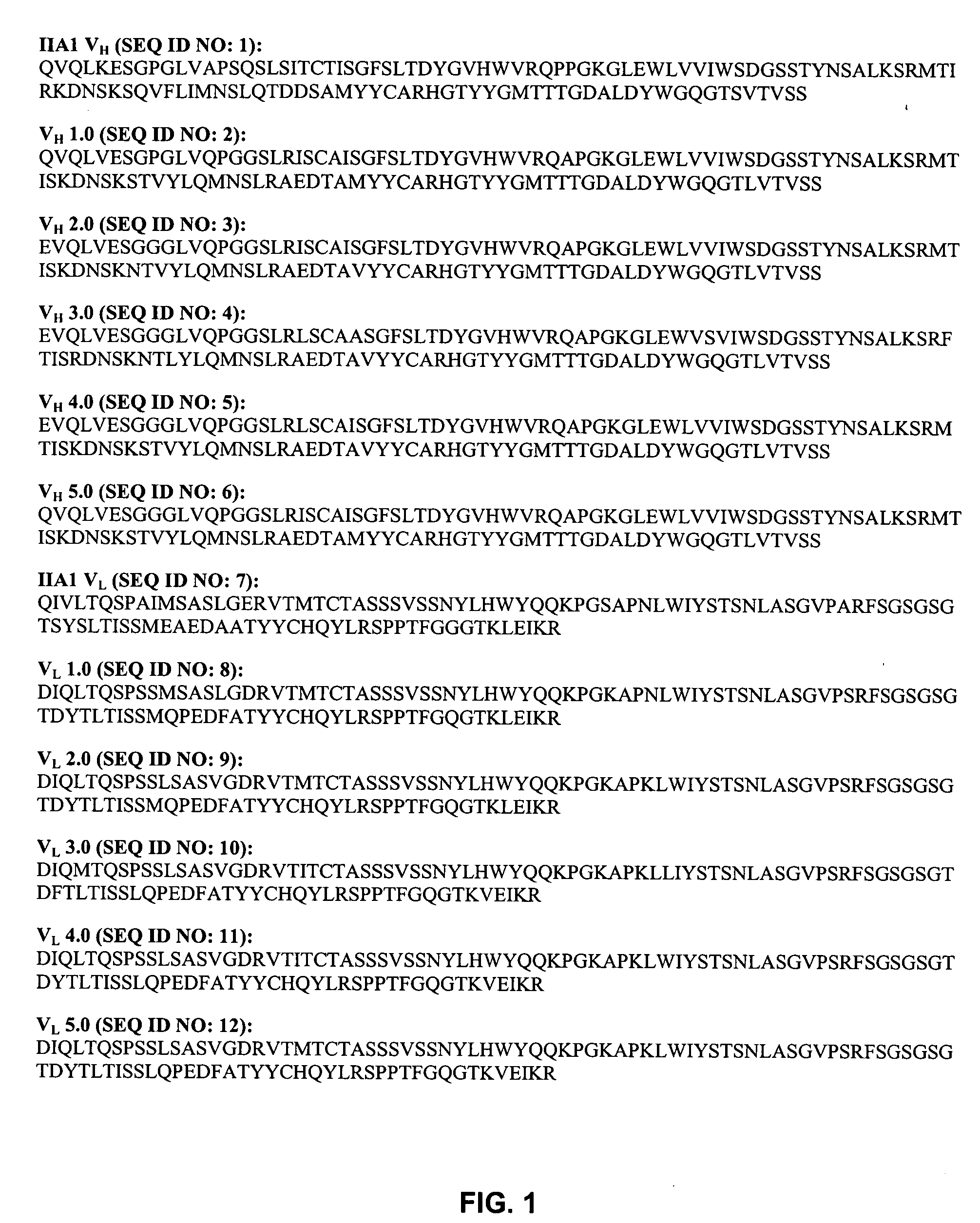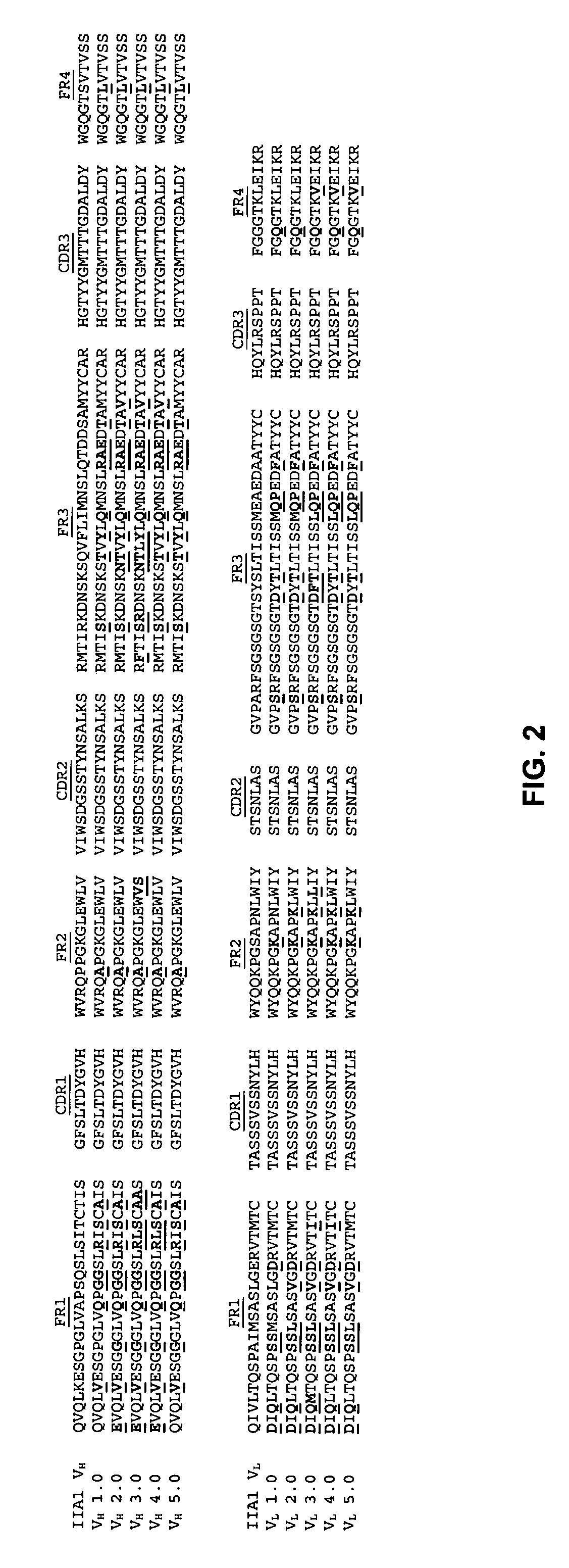Methods of production and use of anti-integrin antibodies for the control of tissue granulation
a technology of antiintegrin and tissue granulation, applied in the field of biochemistry and physiology, can solve the problems of tissue detachment from the underlying membrane, scarring and tissue detachment, and the problem of being particularly acute, and achieve the effect of minimizing tissue damage collateral and reducing deleterious granulation
- Summary
- Abstract
- Description
- Claims
- Application Information
AI Technical Summary
Benefits of technology
Problems solved by technology
Method used
Image
Examples
example 1
Construction of M200 Chimera from Murine IIA1 Anti-α5β1 Integrin
[0167] This example describes construction of the chimeric antibody M200.
[0168] A. Starting DNA Sequences of IIA1 and 200-4 VH and VL Domains
[0169] The variable heavy (VH) and light (VL) domains of the mouse anti-human α5β1 integrin antibody, IIA1 (Pharmingen, San Diego Calif.) were cloned from the IIA1 hybridoma cDNA and sequenced as part of the initial construction of the 200-4 antibody. FIG. 3 shows the cDNA sequences of the IIA1 VH (SEQ ID NO: 13) and VL (SEQ ID NO: 14) domains. During the construction of the 200-4 mouse / human chimeric IgG4 antibody from IIA1, silent XhoI restriction sites (CTCGAG) (SEQ ID NO: 29) were introduced into the framework 4 regions of both IIA1 VH and VL. The 200-4 VH (SEQ ID NO: 15) and VL (SEQ ID NO: 17) DNA sequences containing these silent XhoI sites, as found in expression constructs DEF38 IIA1 / human G4 chimera and NEF5 IIA1 / K chimera, are shown in FIG. 4. These 200-4 VH and VL seq...
example 2
Generation of Fab Fragment F200 from M200
[0180] This example describes making Fab fragment F200.
[0181] Fab fragments are generated from M200 IgG starting material by enzymatic digest. The starting IgG is buffer exchanged into 20 mM sodium phosphate, 20 mM N-acetyl cysteine pH 7.0. Soluble papain enzyme is added, and the mixture is rotated at 37° C. for 4 hours. After digestion the mixture is passed over a protein A column to remove Fc fragments and undigested IgG are removed. Sodium tetrathionate is added to 10 mM and incubated for 30 minutes at room temperature. Finally, this preparation is buffer exchanged into 20 mM sodium phosphate, 100 mM sodium chloride, pH 7.4, to yield the F200 solution.
[0182] Because it is a Fab fragment, the F200 light chain DNA and amino acid sequences are the same as the M200 light chain. The complete F200 heavy chain DNA (SEQ ID NO: 27) and amino acid (SEQ ID NO: 28) sequences are shown in FIG. 11.
example 3
Maintenance of Granulation Inhibitor Serum Levels After Systemic Administration
[0183] This example shows that granulation inhibitor serum levels can be maintained through a regular dosing regime.
[0184] The dosing of each subject was through systemic delivery by intravenous infusion in the cephalic or saphenous vein. The dose volume for each animal was based on the most recent body weight measurement and was 50, 15 or 5 mg / kg. Intravenous infusion was conducted while the animals were restrained in primate chairs, using syringe infusion pumps. The animals were not sedated for dose administration. The dose schedule was once weekly for 4 weeks beginning on the day of laser injury.
TABLE 1# ofRoute ofGroupanimalsadministrationPretreatmentTreatmentDoseDosing13IVlaseredVehicleNA4 doses, weekly21IVlaseredM200 5 mg / kg4 doses, weekly31IVlaseredM20015 mg / kg4 doses, weekly43IVlaseredM20050 mg / kg4 doses, weekly
[0185] The degree of saturation of α5β1 sites on CD14+ monocytes following intra ve...
PUM
 Login to View More
Login to View More Abstract
Description
Claims
Application Information
 Login to View More
Login to View More - R&D
- Intellectual Property
- Life Sciences
- Materials
- Tech Scout
- Unparalleled Data Quality
- Higher Quality Content
- 60% Fewer Hallucinations
Browse by: Latest US Patents, China's latest patents, Technical Efficacy Thesaurus, Application Domain, Technology Topic, Popular Technical Reports.
© 2025 PatSnap. All rights reserved.Legal|Privacy policy|Modern Slavery Act Transparency Statement|Sitemap|About US| Contact US: help@patsnap.com



